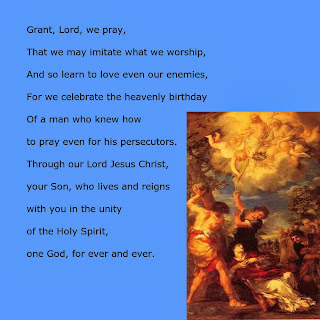
Put on, as God's chosen ones, holy and beloved, heartfelt compassion, kindness, humility, gentleness, and patience, bearing with one another and forgiving one another, if one has a grievance against another; as the Lord has forgiven you, so must you also do. And over all these put on love, that is, the bond of perfection. And let the peace of Christ control your hearts, the peace into which you were also called in one body. And be thankful.
Christmas, by universal consent, is the season for family. It might also celebrate the birth of Christ or the winter solstice; it might be the time for office parties and benevolent distributions of food and clothing. Many exploit the sacred opportunity for another televised football game or consuming more alcohol. But Christmas is especially the season of family gatherings. “I’ll be home for Christmas – if only in my dreams” is sure to bring a tear to the sentimental and the lonely.
Memories of family, childhood, parents, brothers and sisters, games, quarrels, disappointments long-forgotten: all come flooding back as families gather. Some will remember the darkened church as they approached the Mass at midnight or dawn. Christmas, more than any other season, enfolds the past and present into its embrace with its hope for a peaceful future.
The Catholic Church overlays the Christmas season with a dense liturgical tradition; we will not let the Yuletide dissipate with the post-holiday rush to the shopping centers or desperate demands of business. Our sanctuaries are still festooned with evergreen trees, multicolored lights and, especially, the crèche. We sing now the ancient hymns we would not sing in Advent. We stretch the season as far as we can with the feasts of Saint Stephen, the Holy Innocents, the Holy Family, Mary the Mother of God, Epiphany and the Baptism of the Lord.
So today we honor the Holy Family of Jesus, Mary and Joseph. The Catholic Church, with a prophetic voice, reminds the world that human life begins not in the womb but in the family – with all its mystery, complexity and bewildering entanglement.
In today’s reading to the Colossians Saint Paul describes the virtues of the Christian church and family: heartfelt compassion, kindness, humility, gentleness, and patience, bearing with one another and forgiving one another.
Some people can dissimulate these virtues in public. To all the world they look like wonderful fathers and mothers, model husbands and wives. But the truth of their fakery inevitably governs the family. If the word of Christ does not dwell richly in that home, if the Holy Spirit finds no welcome under that sturdy roof and behind that garlanded front door, home can be a fearful place, best avoided and soon deserted. Many children prefer homelessness to such a trap.
But Saint Paul was neither romantic nor idealistic. He spoke from experience when he described the virtues of church and home. He described the life that comes to those who are governed and disciplined by the gratitude in their hearts.
And he knew very well the troubles that beset every family. The Roman word virtue assumes that human life is difficult and often overwhelming. Only the courageous maintain their integrity; most fall by the wayside. His litany of virtues invites us to examine our attitudes toward one another, to recognize our failings with neither shame nor reluctance, and to begin again – daily – the inspired life.
Many people set out to change the world; more often than not they abandon their families in the process. Inevitably their personal failures are shouted from the rooftop as their world-saving efforts crash and burn.
Charity begins at home. And that is why we need the inspiration of the Holy Family.
But Saint Paul was neither romantic nor idealistic. He spoke from experience when he described the virtues of church and home. He described the life that comes to those who are governed and disciplined by the gratitude in their hearts.
And he knew very well the troubles that beset every family. The Roman word virtue assumes that human life is difficult and often overwhelming. Only the courageous maintain their integrity; most fall by the wayside. His litany of virtues invites us to examine our attitudes toward one another, to recognize our failings with neither shame nor reluctance, and to begin again – daily – the inspired life.
Many people set out to change the world; more often than not they abandon their families in the process. Inevitably their personal failures are shouted from the rooftop as their world-saving efforts crash and burn.
Charity begins at home. And that is why we need the inspiration of the Holy Family.













